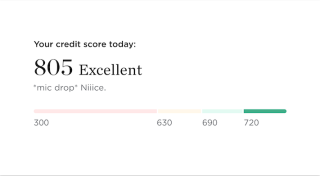Get your free credit score
NerdWallet uses 128-bit encryption to secure your information.

★ 4.8 APP STORE RATING
100+ EDITORS, WRITERS, AND CONTENT SPECIALISTS
10K+ ARTICLES AND FINANCIAL RESOURCES
★ 4.8 APP STORE RATING
Join NerdWallet and monitor your credit score

HOW IT WORKS
Your free credit score with NerdWallet unlocks
Credit monitoring
Check your free credit score and credit report as often as you want, and get alerts about changes so you can manage your credit effectively.
Credit education
Stay on top of your score with insights and alerts tailored to you. Use our credit simulator to check out how actions might affect your score.
Credit card offers
Understand which credit cards fit your financial needs and check out the credit score guidelines for approval.
TESTIMONIALS
Trusted by 14M+ users like you


Great way to keep track of all your accounts in one place, they notify you of big transactions, credit score changes, and the best cards/banks/loan institutions available suited to you!
Gage DeRosia

It’s great! You continually get credit score updates, advice, and free reads! I linked all of my accounts and have monthly graphs of what’s coming in and going out, and includes net worth.
Chad Dunlap
LET'S COVER THE BASICS
Credit score 101
MORE HELP
FAQs

Download the app to make smart money moves


